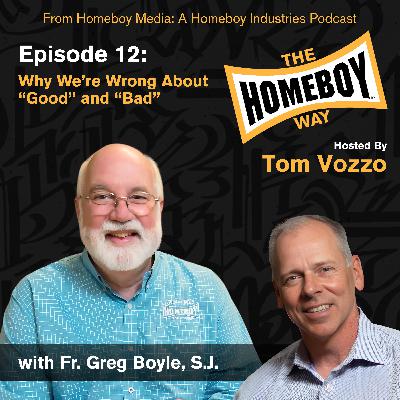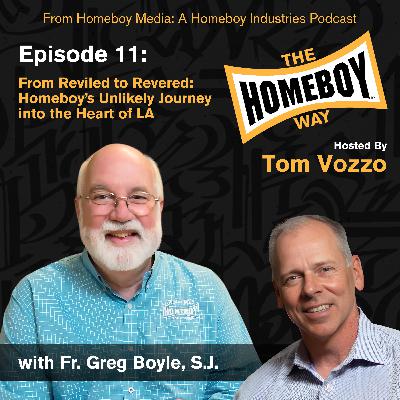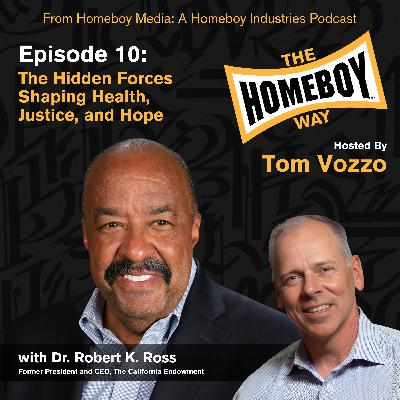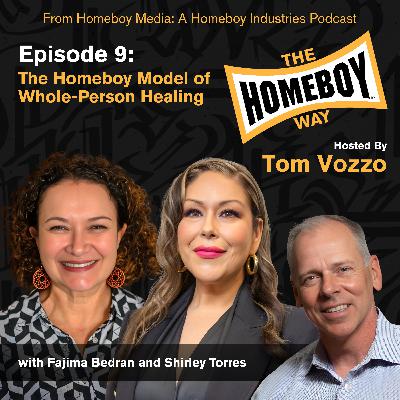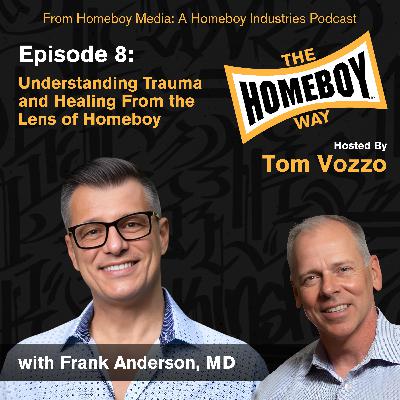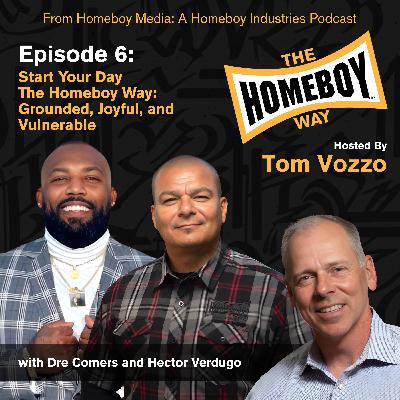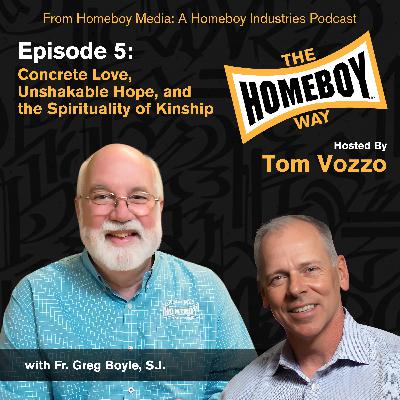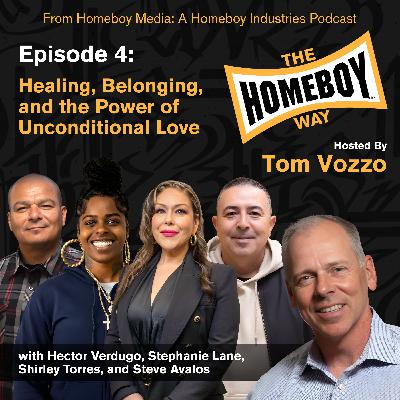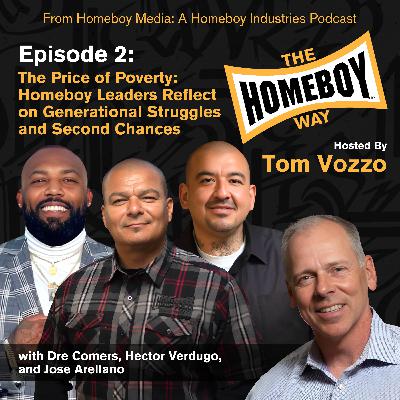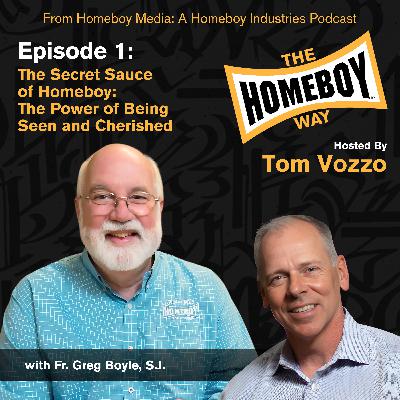Discover The Homeboy Way
The Homeboy Way

The Homeboy Way
Author: The Homeboy Way
Subscribed: 13Played: 142Subscribe
Share
© The Homeboy Way
Description
The Homeboy Way Podcast invites listeners into stories of healing, kinship, and transformation. Hosted by Tom Vozzo, former longtime CEO of Homeboy Industries, alongside Fr. Greg Boyle, S.J., and illuminating guests, the show explores what happens when people are seen, cherished, and given space to heal. The Homeboy team will talk about trauma, redemption, social justice, faith, and business efforts that foster healing, but more than anything, we talk about belonging and what happens when you meet people where they're at. The Homeboy Way, a movement of radical kinship.
22 Episodes
Reverse
Smitty did not come to Homeboy Industries looking for a job or a title. He came looking for his daughter. After incarceration and a painful separation from his child, he arrived at Homeboy for parenting classes, hoping to rebuild his family. What he found was a place where people were allowed to be human, to heal, and to grow without judgment.In this episode of The Homeboy Way, Tom Vozzo sits down with Diwaine "Smitty" Smith to talk about his journey from trainee to navigator, a role that places him on the front lines supporting others through reentry and transition. Smitty reflects on how life inside jail taught him that if people can learn to coexist there, they can learn to do so anywhere. He also shares how a Civil Rights Immersion trip through the South reshaped his understanding of courage, mercy, and responsibility. Through faith, service, and kinship, Smitty’s story shows how personal healing becomes leadership.Key Takeaways Jail Taught Kinship First Incarceration showed Smitty that rivals can coexist. Homeboy proves respect and dialogue make it possible beyond jail.Safe Space for Stumbling and HealingHomeboy allows mistakes with support, wellness days, family priorities, and care without fear of punishment.From Personal Healing to Helping OthersAs a Navigator, Smitty leads with empathy, meeting people where they are and asking how he can help.The Civil Rights Trip’s Profound ImpactWalking in civil rights history reshaped Smitty’s view on nonviolence, resilience, and moving forward.Mercy as a Teachable PracticeSmitty led a class on mercy, sparking honest dialogue about compassion, even when it feels undeserved.In This Episode:00:00 – Introduction 00:26 – Meet Smitty: from trainee to navigator00:56 – The jail mentality and Homeboy’s safe haven02:45 – Smitty’s journey to Homeboy03:34 – Culinary arts and Bread and Roses04:24 – The role of a navigator06:17 – Community organizing and helping others09:50 – The Civil Rights Trail experience12:45 – Reflecting on regional differences13:37 – Impact of Southern history14:26 – Personal transformation and community16:49 – Teaching mercy at Homeboy20:24 – Spiritual journey and personal growth21:49 – Conclusion and final thoughtsNotable Quotes“If we can get along in jail, we can get along anywhere else.” — Smitty [00:01:08]“We took punches from these people so our grandkids wouldn't have to take them.” — Quote from the Civil Rights trip that shifted Smitty's view on courage [10:59]“I came back a different person... showing that love instead of just telling people what to do.” — Smitty [15:58]“I'm a Homeboy for life... even if it's washing dishes at the cafe.” — Smitty [20:12]Resources and LinksHomeboy Industrieshttps://homeboyindustries.org/https://www.youtube.com/@HomeboyIndustries_LA/videosDonate: https://homeboyindustries.org/donate/donate-online/Homeboy Media https://homeboyindustries.org/social-enterprises/homeboy-media/Thomas Vozzohttps://www.linkedin.com/in/thomasvozzoThe Homeboy Way: A Radical Approach to Business and Life: https://www.amazon.com/Homeboy-Way-Radical-Approach-Business/dp/082945456XCredits:Hosted by: Tom VozzoProduced by: Podify, and Alexa Rousso and Melody Carter of Homeboy Media
In this episode of The Homeboy Way, host Tom Vozzo sits down with Fr. Greg Boyle, S.J., founder of Homeboy Industries, to unpack one of the most pervasive challenges for those who come through Homeboy's doors: substance abuse. Drawing from decades of experience, they explore how addiction often serves as self-medication for unhealed trauma, why people numb pain when forced to "excavate wounds," and how programs like AA and NA foster surrender, community, and spiritual awakening. Fr. Greg shares raw stories of homies who first got high only after beginning deep healing work at Homeboy, the shift from drug testing to trusting sobriety for real progress, and the parallel between gang addiction, domestic violence cycles, and substance use. The conversation turns to mercy as the ultimate liberation, beyond transactional forgiveness, and how kinship creates sturdiness against life's knocks.This episode reveals how Homeboy meets people where they are without forcing recovery while offering clear paths to healing, emphasizing that "it takes what it takes" for change, and true freedom comes from mercy upon mercy.Key TakeawaysAddiction as Self-Medication Substances numb the pain of excavating deep wounds from trauma; healing begins when people stop avoiding the "pause" to look at their lives.AA/NA Works Through Surrender Success depends on willingness to cooperate in one's own healing, sharing delusions humbly, and turning life over to a higher power (broadly defined).Harm Reduction and PatienceHomeboy respects readiness: outpatient vs. residential rehab, testing, incentives, or "come back when you're ready"—you can't want recovery more than the person does.Clear Over Tough "Tough love" is often mean; true clarity offers one open door to recovery, like showing a child the exit ramp from a violent freeway.Mercy as Liberation Move beyond back-and-forth forgiveness to pure mercy (just "forth"); it's God's essence, freeing both giver and receiver from clinging to grudges or payback.Spiritual Underpinning The 12 Steps offer a genius American contribution to spirituality: sponsors provide walking companionship, and recognizing a higher power builds resilience.In This Episode:00:00 – Introduction03:49 – The role of AA and NA06:16 – Acknowledging and addressing addiction08:31 – Therapy and alternative coping mechanisms09:09 – Harm reduction and rehabilitation12:58 – The concept of tough love18:44 – Spiritual underpinnings of AA19:56 – Exploring the spiritual basis of healing22:53 – Forgiveness and mercy: A deeper dive23:22 – The historical spread of Christianity25:51 – The concept of mercy in modern times36:41 – The importance of resilience and sturdiness38:23 – Final thoughts on mercy and transformationNotable Quotes ”Excavate the wounds so that you can air 'em out and they can heal and then close up the wound.” — Fr. Greg [01:46]“It takes what it takes.” — Fr. Greg [11:18]“I love you so much that you can't live here anymore..” — Fr. Greg [14:09]“Nothing can touch me 'cause I'm already dead... you have to die before you die.” — Fr. Greg [36:14]“Everybody’s unshakably good and we belong to each other.” — Fr. Greg [37:33]Resources and LinksHomeboy Industrieshttps://homeboyindustries.org/https://www.youtube.com/@HomeboyIndustries_LA/videosDonate: https://homeboyindustries.org/donate/donate-online/Homeboy Media https://homeboyindustries.org/social-enterprises/homeboy-media/Fr. Greg Boyle. S. Jlinkedin.com/in/greg-boyle-s-j-05458514Books: Tattoos on the Heart, Barking to the Choir, The Whole LanguageThomas Vozzohttps://www.linkedin.com/in/thomasvozzoThe Homeboy Way: A Radical Approach to Business and Life: https://www.amazon.com/Homeboy-Way-Radical-Approach-Business/dp/082945456XCredits:Hosted by: Tom VozzoProduced by: Podify, and Alexa Rousso and Melody Carter of Homeboy Media
Miguel Lugo came to Homeboy Industries looking for help removing a chest tattoo that had defined his violent past and kept him trapped long after prison. After serving 18 years behind bars, starting at age 18, Miguel walked through Homeboy’s doors just days after his release. He stood outside for hours, unsure if he was ready to let go of the identity that once kept him alive but was now holding him back.In this episode of The Homeboy Way, Tom Vozzo sits down with Miguel, Community Relations and Head of Security at Homeboy Industries, to trace his journey from a life shaped by violence to one rooted in presence, accountability, and care. Miguel shares how tattoo removal became a path to reclaiming himself, how spiritual practices like sweat lodge ceremonies sustained him in prison, and how therapy helped him confront when harm became acceptable. Today, Miguel stands on the sidewalk welcoming newcomers, diffusing conflict, and walking with people before they ever enter the building. His story shows how deep personal healing becomes sacred work and how choosing love, again and again, turns survival into leadership.Key TakeawaysTattoo Removal as FreedomRemoving gang tattoos was not about jobs. It was about shedding an identity rooted in harm and reclaiming self-ownership.The Power of the SidewalkMany people hesitate before entering Homeboy. Healing often begins outside the door through presence, listening, and trust.Community Relations = Walking With, Not WatchingMiguel reframes safety as walking with people, not watching them, creating belonging instead of fear.Spiritual Practice as SurvivalSweat lodge ceremonies in prison offered grounding, humility, and a connection to identity beyond incarceration.Therapy and the Courage to Ask WhyHealing deepened when Miguel confronted the question of when harming others became acceptable.From Violence to BufferBy stepping between conflict and naming people with care, Miguel and his team prevent harm before it escalates.In This Episode:00:00 – Introduction00:25 – Miguel’s journey begins01:08 – First steps at Homeboy03:06 – Tattoo removal and transformation06:01 – Leaving the gang life behind08:09 – Helping others and building community18:52 – Navigating challenges and misconceptions21:39 – Changing lives for a better future21:59 – Interactions with politicians24:44 – Building a new home26:52 – Spiritual journey and sweat lodges30:42 – Overcoming trauma and finding freedom38:05 – Passion for classic cars42:12 – Final reflections and gratitudeNotable Quotes“Am I okay cleaning toilets? ... I give it a shot.” — Miguel [02:21]“ In tattoo removal, the main thing it got is the freedom from yourself of who you were before.” — Miguel [05:30]“ A lot of people still call it security, but we don't. We like community relations because it does something different. I'm not here to watch you, I'm here to walk with you.” — Miguel [11:53]“In the sweat lodge, I was able to humble myself and give myself up to God.” — Miguel [31:51]“My job now is to be water to fire.”— Miguel [35:33]]Resources and LinksHomeboy Industrieshttps://homeboyindustries.org/https://www.youtube.com/@HomeboyIndustries_LA/videosDonate: https://homeboyindustries.org/donate/donate-online/Homeboy Media https://homeboyindustries.org/social-enterprises/homeboy-media/Miguel Lugohttps://homeboyindustries.org/transformation_story/miguel-lugo-2/Thomas Vozzohttps://www.linkedin.com/in/thomasvozzoThe Homeboy Way: A Radical Approach to Business and Life: https://www.amazon.com/Homeboy-Way-Radical-Approach-Business/dp/082945456XCredits:Hosted by: Tom VozzoProduced by: Podify, and Alexa Rousso and Melody Carter of Homeboy Media
How do you build a business that puts healing, culture, and opportunity first while still making a profit? In this episode of The Homeboy Way, Tom Vozzo sits down with Tepito Coffee co-owners Jose Arellano, Vice President of Operations at Homeboy Industries, and Mike de la Rocha, co-founder of Revolve Impact, to discuss social enterprises, specifically the challenges and successes of running Tepito Coffee. They delve into the significance of providing purposeful structure for those leaving gang life and the pivotal role of social enterprises in creating job opportunities. Tom recounts the creation of the Homeboy Ventures and Jobs Fund, a crucial step in supporting these enterprises. Mike and Jose share their journey from initial struggles, receiving investment, to finding success while staying true to their mission. Through personal stories and lessons learned, they highlight the importance of intentionality, community support, and the transformative power of giving back.Key TakeawaysMission Meets Market RealityRunning a for-profit social enterprise requires tough accountability alongside unwavering support. It's the "next level" after Homeboy's safety net preparing people for the real workforce.Access to Capital Changes EverythingPredatory loans and exclusionary investors nearly ended the business. Homeboy's low-interest investment provided not just funds, but expertise and belief in modest, impactful returns.Homegrown Leadership Is PossibleFrom trainee to VP to co-owner: Jose's journey shows what's achievable when organizations invest in internal talent, inspiring others to dream of ownership.Trauma-Informed Business Takes PatienceHiring system-impacted staff means embracing setbacks, offering dignity in tough conversations, and always leaving the door open for return.Cultural Pride Drives SuccessUnapologetically Chicano and Indigenous branding, combined with specialty quality and authentic storytelling, builds loyal community and disrupts who gets to succeed in coffee.In This Episode:00:00 – Introduction 01:15 – Tom's journey with Homeboy05:28 – The birth of Tepito Coffee15:29 – The struggle for investment and support21:56 – Building a brand with purpose23:56 – The spirit of Homeboy: connecting to the earth and each other24:41 – Training with intentionality: customer service at Tepito Coffee25:18 – Marketing with pride: embracing Chicano and Indigenous roots25:45 – Investing in community: long-term returns beyond capitalism26:23 – Success stories: from barista to business owner28:48 – Balancing accountability and compassion41:13 – Future growth: expanding Tepito Coffee's impactNotable Quotes“ If you have a good product and an authentic story and be unapologetically yourself, you can create a good brand identity and community.” — Mike [06:25]“ I've always been clear studying Homeboy Industries, that the future is in social entrepreneurship.”— Mike [07:51]“ First, you gotta know how to run a business. Then you can decide how to make it a social enterprise.” — Tom [19:15]“ I felt not just rescued by Homeboy, but actually like I felt swooped up by God.” — Jose [38:03]Resources and LinksHomeboy Industrieshttps://homeboyindustries.org/https://www.youtube.com/@HomeboyIndustries_LA/videosDonate: https://homeboyindustries.org/donate/donate-online/Homeboy Media https://homeboyindustries.org/social-enterprises/homeboy-media/Tepito CoffeeVisit: 695 E Colorado Blvd, Pasadena, CAOnline: https://www.tepitocoffee.com/Instagram: https://www.instagram.com/tepitocoffee/Mike de la Rochalinkedin.com/in/mrmikedelarochahttps://www.revolveimpact.com/Jose Arellanolinkedin.com/in/jose-arellano-001966a0Thomas Vozzohttps://www.linkedin.com/in/thomasvozzoThe Homeboy Way: A Radical Approach to Business and Life: https://www.amazon.com/Homeboy-Way-Radical-Approach-Business/dp/082945456XCredits:Hosted by: Tom VozzoProduced by: Podify, and Alexa Rousso and Melody Carter of Homeboy Media
How do you run a real business when your primary mission is healing, kinship, and transformation? In this episode, Tom Vozzo is joined by Homeboy Industries Co-CEO Steve Delgado and longtime advisor Gayle Northrop to explore the social enterprises at the heart of Homeboy.Their conversation centers on people, not products. People coming home from prison. People who have never held a formal job. People carrying trauma alongside hope and a desire to belong. At Homeboy, businesses are designed around that reality, not in spite of it.They explore the tension between mission and margin, speaking honestly about the real costs of being trauma-informed and the courage it takes to invest in people before the world believes they are ready. They reflect on bakeries that employ twice the usual staff, leaders grown from within, and workplaces built on dignity, structure, and accountability.This is lived experience, not theory. A reminder that at Homeboy, businesses exist to serve healing, and when people are met with kinship and structure, they rise together with their community.Key TakeawaysThe Foundational Principle“We don’t employ people to bake bread. We bake bread to employ people.” The social enterprises exist to provide purposeful, healing-centric work.Mission Over Margin Is a Daily ChoiceHomeboy runs real businesses in real markets, but mission always leads. Profit serves people, not the other way around.Social Enterprise Is About Disrupting SystemsTrue social enterprise challenges who is seen as employable and redefines value in the workforce.Trauma-Informed Workplaces Require Structure, Not SlogansBeing trauma-informed means building roles, teams, and systems that support healing, not just good intentions.Investment in People Is the Hard WorkRaising leaders from within takes time, patience, training, and a willingness to walk alongside people through setbacks.Everyone Doesn’t Automatically Know How to Work Employment success depends on stability, resources, transportation, support, and grace, not just effort.In This Episode:00:00 – Introduction 00:30 – Understanding social enterprises03:00 – Homeboy’s unique approach to social enterprise06:59 – Balancing mission and margin18:27 – Trauma-informed workplaces23:18 – Healing-centric workforce development24:14 – The challenges of homegrown leadership25:41 – Investing in internal talent30:42 – The realities of running a social enterprise34:42 – Breaking conventional business wisdom42:00 – Supporting upward mobility through education and opportunity44:20 – Closing reflections and future conversationsNotable Quotes“We don’t employ people to bake bread. We bake bread to employ people.” — Gayle [14:34]“ 95% of our full-time staff who operate and manage our social enterprises have come up through our program.” — Steve [04:54]“ Mission, at least at Homeboy, I think predominates over margin always. And I think that's the right way. I think that's the Homeboy way." — Steve [10:06]Homeboy Industrieshttps://homeboyindustries.org/https://www.youtube.com/@HomeboyIndustries_LA/videosDonate: https://homeboyindustries.org/donate/donate-online/Homeboy Media https://homeboyindustries.org/social-enterprises/homeboy-media/Gayle Northrophttps://www.linkedin.com/in/gaylenorthrop/Steve Delgadohttps://www.linkedin.com/in/steve-delgado-9222523/Thomas Vozzohttps://www.linkedin.com/in/thomasvozzoThe Homeboy Way: A Radical Approach to Business and Life: https://www.amazon.com/Homeboy-Way-Radical-Approach-Business/dp/082945456XCredits:Hosted by: Tom VozzoProduced by: Podify, and Alexa Rousso and Melody Carter of Homeboy Media
In this episode, Tom Vozzo sits down with Hector Verdugo and Jose Arellano to uncover what real transformation looks like when it rises out of pain, survival, and the quiet moments no one ever sees. Their journeys begin in places shaped by violence, incarceration, addiction, and childhood wounds carried for decades, but something unexpected happens the moment they walk through Homeboy’s doors: they encounter a kind of love they never knew existed.What starts as a search for a job becomes the beginning of a spiritual awakening, a creative writing assignment that cracks open long-buried memories, a simple handshake that softens lifelong defense mechanisms, a hug from Father Greg that feels more like home than anything they grew up with. Hector and Jose describe how healing does not arrive neatly or instantly, but through tears, reflection, and the slow realization that God was not punishing them; God was accompanying them.As they revisit these stories, they reveal what the Homeboy Way truly is: radical kinship, unconditional acceptance, and the kind of love that meets people exactly where they are. Their reflections remind us that transformation does not replace suffering; it grows through it, and every moment of honesty, every act of courage, and every small gesture of kindness becomes a step toward wholeness and a new way of being.Key TakeawaysLove Comes First, Transformation FollowsHector and Jose explain how Homeboy’s approach is not about fixing people but loving them. Transformation happens when someone finally feels safe enough to be vulnerable and seen.Healing Begins with Telling the TruthCreative writing classes and quiet moments of reflection cracked open long-buried childhood wounds, allowing emotions to surface for the first time in decades.Kinship Is a Radical, Daily PracticeAccepting, investing, showing up, and staying committed even when it’s messy is the heart of the Homeboy way.Reimagining Love After TraumaBoth men had to unlearn the violent, survival-based versions of love they grew up with and discover what real compassion, fatherhood, and belonging feel like.The Wilderness as a Healing ClassroomFrom snowboarding to sushi to snorkeling with sharks, new experiences help homies expand their sense of possibility and reclaim a life beyond survival.In This Episode:00:00 – Introduction00:42 – Hector’s arrival at Homeboy and his turning point08:10 – Jose’s near-life sentence, grief, and search for change12:27 – The mystical invitation that led Jose to Homeboy14:39 – Early resistance, fear, and learning to receive kindness17:55 – Childhood wounds resurfacing through creative writing23:11 – Falling in love with Homeboy’s culture of healing31:28 – Defining “the homeboy way”34:57 – Radical kinship and why transformation starts within35:48 – Snorkeling stories and facing a hammerhead shark43:56 – Why nature transforms the homies47:35 – Closing reflections on love, vulnerability, and kinshipNotable Quotes“God is too busy being in love with you to ever be disappointed in you.” — Hector [20:54]“My mother died as a gang member, and if I had never come to Homeboy, I would have died like that as well.” — Jose [12:54]“I think Homeboy fell in love with me first, to be honest.” — Jose [24:18]Resources and LinksHomeboy Industrieshttps://homeboyindustries.org/https://www.youtube.com/@HomeboyIndustries_LA/videosDonate: https://homeboyindustries.org/donate/donate-online/Homeboy Media https://homeboyindustries.org/social-enterprises/homeboy-media/Hector Verdugohttps://www.linkedin.com/in/hector-verdugo-7297a684Jose Arellanohttps://www.linkedin.com/in/jose-arellano-001966a0Thomas Vozzohttps://www.linkedin.com/in/thomasvozzoThe Homeboy Way: A Radical Approach to Business and Life: https://www.amazon.com/Homeboy-Way-Radical-Approach-Business/dp/082945456XCredits:Hosted by: Tom VozzoProduced by: Podify, and Alexa Rousso and Melody Carter of Homeboy Media
For decades, the team at Homeboy Industries has stood witness to a quiet revolution. Lives are rewritten not through force, judgment, or programs alone, but through the slow, steady practice of kinship.In this episode, Tom Vozzo is joined by Hector Verdugo and Shirley Torres to reflect on the stories that have shaped them as much as the people living them. Day after day, people walk into Homeboy carrying the invisible: trauma that shaped them, systems that failed them, and identities formed in survival mode. Over time, through consistency, humor, honesty, frustration, and grace, those same individuals discover the possibility of becoming someone they were never allowed to be.The three reflect on the privilege of walking alongside that transformation, not as saviors or fixers, but as fellow travelers who are changed in the process. At Homeboy, stories are not trophies or statistics. They are teachers. They stretch us, soften us, call us forward, and remind us that everyone is still becoming.Key Takeaways"Exquisite Mutuality" is the Secret SauceTransformation at Homeboy is never a one-way street. It is a reciprocal relationship.Kinship, Not Curriculum, Creates TransformationLove, not lectures, is what shifts shame, fear, or survival instincts into openness and trust.Judgment Doesn’t Grow People; Gentleness DoesA butchered tree still grows back; sometimes the most important thing is simply letting go.Love That Shows Up UnaskedWhen someone calls from federal prison to comfort you in grief, that’s God in work boots.Mutual Healing Is the Secret SauceNo one here is “saving” anyone; everyone is being changed, challenged, raised, and restored.In This Episode:00:00 – Introduction00:29 – The power of stories01:37 – Joanna: anger, armor, and the road to law school03:39 – Parole, board meetings, and unseen burdens05:14 – Humor, respect, and breaking the ice07:32 – Mutual raising in community09:20 – Shirley’s story coming to Homeboy as a kid10:52 – Loss, grief, and the surprise phone call that healed13:05 – Unconditional love within the Homeboy culture13:53 – Luis "Coloso," Butchered Trees, and Letting Go of Control16:38 – Addiction, mental health, and spiritual bypassing18:07 – Angelo: from hoodie to hope20:11 – How do you measure transformation without metrics?23:51 – Choosing compassion when someone is “difficult”24:57 – Times Square, armor, and becoming nine again25:48 – Closing reflections on patience and second chancesNotable Quotes“ I've had sort of my big life moments here and one of those moments was losing my dad and I think about how Homeboy showed up for me.” — Shirley [09:37]“ A place like Homeboy is all about the exquisite mutuality.” — Shirley [11:59]“It’s just love and seeing you, saying 'Hi, I see you,' and then eventually putting your arm around them." — Hector [19:44]Resources and LinksHomeboy Industrieshttps://homeboyindustries.org/https://www.youtube.com/@HomeboyIndustries_LA/videosDonate: https://homeboyindustries.org/donate/donate-online/Homeboy Media https://homeboyindustries.org/social-enterprises/homeboy-media/Hector Verdugohttps://www.linkedin.com/in/hector-verdugo-7297a684Shirley Torreslinkedin.com/in/shirley-torres-1a9516a2Thomas Vozzohttps://www.linkedin.com/in/thomasvozzoThe Homeboy Way: A Radical Approach to Business and Life: https://www.amazon.com/Homeboy-Way-Radical-Approach-Business/dp/082945456XCredits:Hosted by: Tom VozzoProduced by: Podify, and Alexa Rousso and Melody Carter of Homeboy Media
In this episode, former Homeboy Industries CEO Tom Vozzo sits down with three powerful voices from the Homeboy community: Fabian, Sergio, and Jose. Together, they explore what it truly means to awaken spiritually, especially in the middle of suffering, trauma, addiction, incarceration, and generational pain.While Homeboy is often celebrated for its job programs and re-entry success, the real transformation happens in the unseen places: a prison cell, a childhood memory, a moment of collapse, or in the quiet stillness of a 4:00 a.m. prayer.Fabian, Sergio, and Jose each share how faith emerged not instead of suffering but through it in addiction, violence, poverty, regret, and loss, forming the bedrock of their healing. Their stories challenge the idea of a God who punishes, opening up a more spacious, merciful vision of a God who sustains, accompanies, and restores.They also discuss how spiritual grounding becomes a daily practice of surrender, gratitude, contemplation, and showing up for others, because as they remind us, every word, every step, and every action is a prayer.Key TakeawaysA God Who Sustains, Not PunishesRather than a God who protects us from pain, they speak of a God who walks with us through it, offering mercy, companionship, and unexpected grace.Spirituality Is a Daily PracticeStillness, early morning readings, gratitude lists, sweat lodge wisdom, and Homeboy’s contemplative culture shape their spiritual lives into something lived, not talked about.Community as Evidence of GodHomeboy itself becomes a sacred space: laughter in the hallways, a hug in the right moment, a homie getting his first apartment. Transformation happens together.Forgiveness Evolves Into Mercy and GraceRather than a transactional I forgive you, they learned to offer mercy: Welcome back. Come here. You are home. That same mercy becomes a template for how they see themselves.Joy Is the Fruit of a Healed LifeFrom seeing their children thrive to watching homies grow into their purpose, joy shows up as a quiet anchor, a reminder of how far they have come.In This Episode:00:00 – Introduction02:42 – Jose’s spiritual awakening in isolation09:14 – Fabian’s journey from childhood to awakening14:39 – Sergio’s early prayers and spiritual awakening18:18 – Reflections on suffering and God’s presence25:55 – Evolving faith and deepening spiritual insights27:02 – Daily practices for spiritual strength28:01 – Living prayerfully and mindfully29:16 – The power of gratitude32:19 – Faith in action through community and service33:34 – Forgiveness, mercy, and healing40:55 – Finding joy in life, family, and transformationNotable Quotes"If God saw me through that freeway incident, what can He not see me through now?" — Fabian [13:07]“Every step you take is a prayer. Every word you utter is a prayer. Every action is a prayer.” —Jose [28:25]“God protects us from nothing but sustains us in all things.” — Sergio [26:05]“ With Father Greg, he never said, I forgive you. He said, "Welcome back.” — Sergio [35:40]Resources and LinksHomeboy Industrieshttps://homeboyindustries.org/https://www.youtube.com/@HomeboyIndustries_LA/videosDonate: https://homeboyindustries.org/donate/donate-online/Homeboy Media https://homeboyindustries.org/social-enterprises/homeboy-media/Fabian Deborahttps://www.linkedin.com/in/fabian-debora-886279a/Sergio Basterrecheahttps://www.instagram.com/sergiobasterrechea/?hl=enhttps://www.godspantry.org/Jose Arellanolinkedin.com/in/jose-arellano-001966a0Thomas Vozzohttps://www.linkedin.com/in/thomasvozzoThe Homeboy Way: A Radical Approach to Business and Life: https://www.amazon.com/Homeboy-Way-Radical-Approach-Business/dp/082945456XCredits:Hosted by: Tom VozzoProduced by: Podify, and Alexa Rousso and Melody Carter of Homeboy Media
In today’s episode of The Homeboy Way, Tom Vozzo and Fr. Greg Boyle, S.J. delve into the hidden weight of the labels society places on people. They revisit pivotal moments in Homeboy’s history, recalling times when homies were swiftly branded as “bad” or “evil,” and how those judgments shaped everything that came after. Through these reflections, Father Greg illustrates how behaviors rooted in trauma, addiction, or mental illness are often misread as fixed character traits, creating barriers that keep individuals shut out from opportunity, understanding, and compassion.Tom presses into these memories, asking why the world is so quick to judge and so slow to understand. Father Greg reflects on what decades at Homeboy have made unmistakably clear: people act from pain long before they act from choice, and when we reduce them to their worst moments, we lose sight of the human being still trying to surface beneath it all.Together, they explore how demonizing language stalls progress, why accountability needs compassion to truly work, and how healing begins when we stop treating people as categories and start meeting them as individuals.Key TakeawaysReal transformation begins with how we see people.Father Greg makes it clear that the moment we divide the world into good and bad, we lose the ability to create solutions. Healing only happens when we refuse to label and instead look underneath the behavior to the wounds, trauma, and mental health struggles that shaped it.Goodness is always present, even when it is buried. At Homeboy, people learn to reclaim their dignity because the community holds up a mirror that says you are noble, you are worthy, you belong. When people access that truth, violent behavior evaporates because they stop living from fear and start living from their inherent goodness.Health replaces judgment. Instead of asking who is bad or who is evil, the better question is who is hurting and how can we help them heal. Father Greg shows that demonizing language ends conversation, but curiosity opens a path toward understanding.In This Episode:00:00 – Introduction to The Homeboy Way00:44 – Why the "good vs. bad people" myth prevents progress02:16 – The L.A. County Jail as the world's largest mental institution03:00 – The difference between explaining behavior and excusing it04:10 – Moving from "good vs. bad cops" to "healthy vs. unhealthy cops"06:17 – Why Father Greg doesn't believe in "evil"08:18 – How the label "pure evil" almost cost a man his future09:37 – Re-interpreting biblical concepts of demons and evil through a modern lens12:30 – Generational and cultural differences in language (The Pope, the Devil, and Satan)15:27 – Finding heaven in the present moment through kinshipNotable Quotes"As long as you think that there are good people and bad people, then we're stuck in the mud. It's why we don't make progress." — Fr. Greg (00:51)"Everybody is unshakably good and that we belong to each other." —Fr. Greg (01:03)"The minute you call it evil, it ends all discussion.."— Fr. Greg (07:33)Resources and LinksHomeboy Industrieshttps://homeboyindustries.org/https://www.youtube.com/@HomeboyIndustries_LA/videosDonate: https://homeboyindustries.org/donate/donate-online/Homeboy Media https://homeboyindustries.org/social-enterprises/homeboy-media/Father Greg Boylehttps://www.linkedin.com/in/greg-boyle-s-j-05458514Books: "Tattoos on the Heart," "Barking to the Choir," "The Whole Language"Thomas Vozzohttps://www.linkedin.com/in/thomasvozzoThe Homeboy Way: A Radical Approach to Business and Life: https://www.amazon.com/Homeboy-Way-Radical-Approach-Business/dp/082945456XCredits:Hosted by: Tom VozzoProduced by: Podify, and Alexa Rousso and Melody Carter of Homeboy Media
In this episode of The Homeboy Way, Tom Vozzo sits down with Fr. Greg Boyle, S.J., the founder of Homeboy Industries, to unpack Homeboy Industries’ long and complicated relationship with government agencies. Fr. Greg reflects on how Homeboy went from reviled to revered, yet still receives little public funding, while Tom recalls early encounters with officials who believed they could do Homeboy’s work better inside the system, unaware of the heart and humanity that drive the mission.Together, they explore why bureaucracy often gets in its own way, shaped by outsider assumptions, political pressure, and a focus on legacy over real impact. They describe shifting relationships with law enforcement, moments of meaningful partnership, and the ongoing struggle to secure support without compromising mission or purity of purpose.This episode reminds us that hope, community wisdom, and authentic relationships, not top-down policies, are what truly transform lives.Key TakeawaysReal change begins with listening to the people on the ground.Policy fails when it’s shaped by outsiders who never ask communities what actually works. Real solutions come from those closest to the struggle.Hope moves people more than punishment ever will.Longer sentences and tougher policing do not stop violence. Homeboy shows that transformation starts when people believe they have a future.Staying true to the mission matters.Homeboy refused to reshape its identity to fit government requirements. Protecting the integrity of their work mattered more than chasing funding.Humility from leaders creates space for real progress.The most impactful officials were the ones willing to listen, ask questions, and admit they didn’t have all the answers.Community programs outperform forced systems.Government agencies often claim they can do the work better, especially in jails, but voluntary healing at Homeboy is far more effective than captive-audience programs.Mental health is the deeper crisis.Rising violence in detention centers points to untreated emotional wounds intensified by trauma, isolation, and the pandemic.In This Episode:00:00 – Introduction to The Homeboy Way00:41 – The government's role: good intentions, slow execution02:03 – Homeboy's journey from "reviled to revered"02:54 – The challenge of partnering with bureaucracy05:25 – Resisting funding to protect mission purity08:49 – The problem of the "outsider view" in policy design11:21 – Addressing the "lethal absence of hope"13:28 – Evolving relationships with police and sheriff departments17:40 – The surprising benefits of youth probation camps21:46 – Conclusion: belief in second chancesNotable Quotes"We won't become who you want us to become. We think we know what we're doing. Fund what we're doing, or don't." — Fr. Greg (08:20)"We went from reviled to revered. It really was quick." —Fr. Greg (01:49)"We're not that concerned about legacy. And every elected official is concerned about legacy."— Fr. Greg (04:06)"Rather than say, let's stop the violence, Homeboy says, wait, the violence is about a lethal absence of hope. Let's address the despair."— Fr. Greg (10:31)"Mental health is the defining health issue of our time." — Fr. Greg (20:13)Resources and LinksHomeboy Industrieshttps://homeboyindustries.org/https://www.youtube.com/@HomeboyIndustries_LA/videosDonate: https://homeboyindustries.org/donate/donate-online/Homeboy Media https://homeboyindustries.org/social-enterprises/homeboy-media/Father Greg Boylehttps://www.linkedin.com/in/greg-boyle-s-j-05458514Books: "Tattoos on the Heart," "Barking to the Choir," "The Whole Language"Thomas Vozzohttps://www.linkedin.com/in/thomasvozzoThe Homeboy Way: A Radical Approach to Business and Life: https://www.amazon.com/Homeboy-Way-Radical-Approach-Business/dp/082945456XCredits:Hosted by: Tom VozzoProduced by: Podify, and Alexa Rousso and Melody Carter of Homeboy Media
In this episode of The Homeboy Way, Tom Vozzo sits down with Dr. Robert K. Ross, former CEO of The California Endowment, for a powerful conversation about healing, justice, and what it means to truly see people living at the margins. Reflecting on decades as a pediatrician, public health leader, and philanthropic executive, Dr. Ross revisits the moments that shaped his path from the crack epidemic of the 1980s to the rise of public health as a movement to the day the Homeboy way reshaped how he understood philanthropy.Through vivid stories, he explains why foundations must stop fixing communities and start listening to them. He shares how Homeboy helped him move from research-driven decision-making to a more human, moral, and spiritually grounded approach.Tom and Dr. Ross explore how policy shifts when data meets lived experience, why the government keeps missing the mark, and what real support for marginalized leaders requires.Key TakeawaysReal community change starts with seeing beyond individual problems.Dr. Ross’ journey shows that healing must shift from clinical care to addressing the deeper forces that shape people’s lives. Poverty, violence, addiction, and trauma are not isolated issues but interconnected conditions that require a wider lens.Social determinants must guide every decision.Health is shaped by safety, opportunity, environment, and dignity. The example of women walking in cemeteries for safety makes clear that neighborhoods influence wellness more than medical systems do. Policy and funding must prioritize these realities.Philanthropy works best when it listens.Dr. Ross learned to move from top-down decision-making to partnership. Communities hold wisdom born from lived experience, and real change happens when that wisdom shapes programs, funding, and strategy.Grants carry strategic, moral, and spiritual purposes.They support services, challenge unjust systems, and affirm the humanity of those served. When philanthropy sees people rather than problems, the work becomes deeper, more honest, and more transformative.Invest in Infrastructure, Not Just Mission.For charismatic, mission-driven organizations to endure, funders must also support the operational and business-side capacity building.In This Episode:00:00 – Opening and introduction to Dr. Robert K. Ross01:03 – Dr. Robert K. Ross from pediatrician to philanthropy02:00 – The impact of crack cocaine on communities03:37 – A family story that shifted everything05:08 – Transition to public health and philanthropy09:51 – Challenges and lessons in philanthropy16:27 – The broader view of health and community21:07 – Government’s role in community policy21:47 – The power of stories and data22:15 – School discipline and health24:12 – Campaigning for change with Schools Not Prisons26:08 – Supporting Homeboy Industries29:07 – Challenges and lessons in funding37:52 – Faith and philanthropy41:08 – Conclusion and gratitudeNotable Quotes"I wanted to be a healer for a community and not just a patient." — Dr. Ross (05:41)"No numbers without stories. No stories without numbers."—Dr. Ross (21:44)"Poor people pray hard."— Dr. Ross (39:48)“We see you, we hear your story, your pain, your trauma, your hopes and dreams.”Dr. Ross (13:34)"I’ve always been attracted by the power of listening and humility" — Dr. Ross (27:41)Resources and LinksHomeboy Industrieshttps://homeboyindustries.org/https://www.youtube.com/@HomeboyIndustries_LA/videosDonate: https://homeboyindustries.org/donate/donate-online/Homeboy Media https://homeboyindustries.org/social-enterprises/homeboy-media/Dr. Robert K. Rosshttps://www.calendow.org/Thomas Vozzohttps://www.linkedin.com/in/thomasvozzoThe Homeboy Way: A Radical Approach to Business and Life: https://www.amazon.com/Homeboy-Way-Radical-Approach-Business/dp/082945456XCredits:Hosted by: Tom VozzoProduced by: Podify, and Alexa Rousso and Melody Carter of Homeboy Media
In this episode, Homeboy Industries Co-CEO Shirley Torres and longtime Clinical Director Fajima Bedran join Tom Vozzo, former CEO of Homeboy Industries, to discuss what truly transforms lives: healing. While Homeboy is widely known for its job programs and re-entry success stories, Father Greg Boyle recognized years ago that the real work lies in healing trauma. Each trainee has endured layers of pain, childhood abuse, foster care, incarceration, addiction, and the mission is not just to ease their misery but to help them become whole.Shirley, Fajima, and Tom explain that healing at Homeboy extends beyond therapy rooms and happens in hallways, morning meetings, and even on the dance floor. Therapy is integrated into everyday life, with community-based counseling and cutting-edge modalities like EMDR and neurofeedback. Through stories of transformation, Shirley and Fajima illustrate how Homeboy’s therapeutic community fosters joy, suffering, and, most importantly, belonging, which they believe is the first and most essential form of medicine.Key TakeawaysThe Community is the ClinicWhere traditional therapy can be sterile, Homeboy’s healing is woven into its fabric through a tap on the shoulder, a shared dance, or a repaired relationship. This community builds the trust necessary for deep clinical work.Healing the Wound, Not Just the BehaviorSystems often focus on changing behavior. Homeboy’s model digs deeper to address the underlying complex trauma and pain, the why behind the behavior, so people can stop transmitting their pain.From "Fixing" to "Accompanying"The goal is not to "save" people, but to walk with them, repair ruptures, and hold the door open. As Shirley says, the staff are "hope in the flesh," living testaments that transformation is possible.In This Episode:03:21 – Whole-person healing and cultural roots of care03:40 – Mental health counseling the Homeboy way07:36 – Building a therapeutic community15:44 – Post-pandemic challenges and psychiatric care19:14 – Dancing, joy, and the power of community22:06 – Father Greg’s philosophy and trauma-informed leadership27:01 – What “trauma-informed” means at Homeboy30:31 – Staying hopeful amid pain and transformationNotable Quotes“We stand with people and we invest in them fully. That means making sure we don't surrender to people just being less miserable.” — Shirley [01:52]“It's the sessions plus the community. That's what makes way for when people are in front of us when they get into therapy.” — Fajima [06:54]“Joy and suffering coexist. There's that spaciousness. And I think that's such an important belief people love.” — Shirley [19:39]“We're not saving people. You're also saving yourself. And we're in this together.” — Fajima [27:23]About Our GuestsShirley Torres is the Co-CEO of Homeboy Industries, a role she stepped into after over two decades of leading and architecting its programmatic and healing services. She is a driving force behind the organization's trauma-informed culture and its focus on whole-person transformation.Fajima Bedran is the Director of Mental Health at Homeboy Industries, a licensed clinician who has been with the organization for 20 years. She has been instrumental in integrating advanced, evidence-based clinical practices like EMDR and neurofeedback to address complex trauma within the Homeboy community.Resources and LinksHomeboy Industrieshttps://homeboyindustries.org/https://www.youtube.com/@HomeboyIndustries_LA/videosDonate: https://homeboyindustries.org/donate/donate-online/Homeboy Media https://homeboyindustries.org/social-enterprises/homeboy-media/Shirley Torreshttp://linkedin.com/in/shirley-torres-1a9516a2Thomas Vozzohttps://www.linkedin.com/in/thomasvozzoThe Homeboy Way: A Radical Approach to Business and Life: https://www.amazon.com/Homeboy-Way-Radical-Approach-Business/dp/082945456XCredits:Hosted by: Tom VozzoProduced by: Podify, and Alexa Rousso and Melody Carter of Homeboy Media
Dr. Frank Anderson shares the science of healing and how it connects to the Homeboy way of kinship.Dr. Frank Anderson, a Harvard-trained psychiatrist, trauma expert, and best-selling author, breaks down the science and spirituality of trauma healing and how it connects to the work of Homeboy Industries. We discuss why trauma is externally defined while PTSD is a personal response, the difference between single-event trauma and complex trauma, and how healing requires corrective experiences, community, and patience, and why forgiveness should follow healing, not precede it.Dr. Anderson shares why spirituality (not organized religion) is vital for healing, why premature forgiveness can be harmful, and how leaders themselves must confront their own trauma to create workplaces where people thrive. Together, we explore how Homeboy Industries is modeling a trauma-informed approach to community transformation, and why this model can ripple into corporate spaces, executive leadership, and beyond.What You’ll Learn in This Episode:The neuroscience of trauma and why love is the most powerful healing agent.Why forgiveness should follow healing, not precede it.How both victim and perpetrator roles live inside us, and why acknowledging this duality is essential.How trauma-informed workplaces increase productivity, belonging, and engagement.Why Homeboy Industries’ holistic approach offers a blueprint for rethinking therapy, reentry, and leadership.In This Episode:00:00 – Introduction00:39 – Why trauma is at the center of healing02:27 – Dr. Anderson’s journey from psychiatrist to healer06:42 – What is trauma, really?08:47 – Understanding complex trauma11:41 – Why mental health therapy works and when it doesn’t14:47 – The power of positive regard and compassion16:09 – The role of forgiveness in healing19:44 – How to release pain and rewire the brain22:58 – Love and connection as tools for recovery25:59 – How Dr. Anderson connected with Homeboy28:09 – Why spirituality matters in healing33:18 – Trauma in leadership and corporate life37:23 – How love transcends fear and violence39:30 – Final reflectionsNotable Quotes"Trauma blocks who we are. And so a lot of clearing and healing in order to be able to kind of step into that position." — Frank Anderson (06:32)"Complex trauma is relational trauma. It's trauma that happens relationally." — Frank Anderson (08:47)"The mental health field has this: you're bad, you're broken. You need to be fixed mentality." — Frank Anderson (13:35)"Trauma blocks love, Love heals trauma." — Frank Anderson (23:14)"Love supersedes violence and fear. It's gotta be elevated because trauma is about fear and being violated." — Frank Anderson (37:23)Resources and LinksHomeboy Industrieshttps://homeboyindustries.org/https://www.youtube.com/@HomeboyIndustries_LA/videosDonate: https://homeboyindustries.org/donate/donate-online/Homeboy Media https://homeboyindustries.org/social-enterprises/homeboy-media/Frank Anderson, MDhttps://www.linkedin.com/in/frank-anderson-654b1836/https://www.frankandersonmd.com/Thomas Vozzohttps://www.linkedin.com/in/thomasvozzoThe Homeboy Way: A Radical Approach to Business and Life: https://www.amazon.com/Homeboy-Way-Radical-Approach-Business/dp/082945456XCredits:Hosted by: Tom VozzoProduced by: Podify, and Alexa Rousso and Melody Carter of Homeboy Media.
In this episode of The Homeboy Way, Tom Vozzo sits down with Fabian Debora, Inez Salcido, and Jose Arellano to explore what recovery truly means at Homeboy Industries. Fabian reflects on his personal journey with addiction, while Inez shares how her team prioritizes stabilizing housing and relationships before addressing substance use. Jose discusses how Homeboy’s strength lies in trust, which guides individuals toward help they may not yet believe they deserve.At Homeboy, recovery is about more than just overcoming addiction; it's about seeing the person behind the pain and offering hope. This episode reminds us that transformation is possible when we walk together, believing in each other’s potential.Key TakeawaysRecovery starts with compassion, not control.Healing begins by meeting people where they are, focusing on stability, safety, and community before anything else. Compassion creates trust, which is the foundation for healing.Addiction is a disease, not a defect.Substance abuse often stems from deep trauma, and recognizing it as a disease helps foster empathy rather than shame, allowing for a more holistic view of the person.Suffering leads to surrender.Real recovery often begins when control is lost, and surrender happens in the midst of pain and rock-bottom moments. Faith and healing are born from this surrender.Recovery is a way of life.Recovery is an ongoing choice to live with honesty and purpose, using tools like the 12 Steps to rebuild life, not just abstaining from substances."Spoonfeed" recovery; don't force it.Recovery should be presented as an inviting choice, empowering individuals to take ownership of their journey, rather than feeling punished or coerced.Love never gives up.At Homeboy, relapse or failure doesn’t mean giving up on someone. The team welcomes people back with patience and hope, believing that every setback is part of the journey forward.In This Episode:00:00 – Introduction to Homeboy Industries00:29 – Demystifying AA and NA01:30 – Challenges of substance abuse02:16 – Approaches to recovery03:19 – Personal stories of addiction05:29 – Building trust and relationships12:39 – The role of rehab and medication19:01 – Spirituality in recovery26:48 – Living the 12 Steps every day31:39 – The importance of community support33:17 – Understanding harm reduction42:14 – Debating marijuana as a gateway drug47:56 – Concluding thoughts on recovery and supportNotable Quotes"When you try to push someone and force someone into recovery or rehab, immediately you can lose the battle there." — Fabian (08:18)"Recovery is a lifestyle. It's not just let me go to rehab. I'm good for now. We got to learn this new way of life." — Inez (12:48)“We have more access to controlled substances than we ever have. I think big pharma has contributed to that." — Jose (02:00)Resources and LinksHomeboy Industrieshttps://homeboyindustries.org/https://www.youtube.com/@HomeboyIndustries_LA/videosDonate: https://homeboyindustries.org/donate/donate-online/Homeboy Media https://homeboyindustries.org/social-enterprises/homeboy-media/Fabian Deboralinkedin.com/in/fabian-debora-886279aJose Arellanohttps://www.linkedin.com/in/jose-arellano-001966a0/Thomas Vozzohttps://www.linkedin.com/in/thomasvozzoAdditional ResourcesAlcoholics AnonymousNarcotics AnonymousAl-Anon Family Groups
In this episode, Tom Vozzo sits down with Dre Comers and Hector Verdugo to talk about one of the most meaningful parts of life at Homeboy Industries: the morning meeting. Held every weekday, it’s a space where the entire community comes together to connect, reflect, and support each other.Dre shares what it was like joining Homeboy with a background in nonprofit work, and how the culture of presence and honesty made him stay. Hector offers insight into why celebrating small wins, like birthdays or a year of sobriety, matters more than people realize.The episode also features two moving “Thoughts of the Day” from community members. Ricky talks about returning after setbacks and learning to take the program seriously. Debrah, released after 36 years in prison, reflects on what freedom means beyond physical release.This conversation offers a closer look at how daily rituals, real connection, and radical acceptance shape transformation at Homeboy Industries.Key TakeawaysMorning meetings create a space for grounding, joy, and vulnerabilityAuthentic leadership at Homeboy begins with humility and compassionReal change often starts after failure or hesitationWalking away from gang life is emotionally complex and spiritualHomeboy always welcomes people back, no matter how many times they’ve leftFreedom includes emotional and spiritual release, not just physical libertySpirituality is part of the culture, not imposed through religionTransformation happens when people feel loved, safe, and seenIn This Episode[00:00] Introduction[00:27] What is morning meeting and why it matters[00:59] Celebrating sobriety, birthdays, and small wins[02:13] Anatomy of a morning meeting[03:29] The role of “Thought of the Day”[06:08] Ricky’s story: Better Late Than Never[08:28] Leaving your gang and the fear of starting over[09:58] Why Homeboy always gives people another chance[12:04] Debrah’s story: Reentry after 36 years incarcerated[14:21] Adjusting to freedom outside the prison walls[16:23] Unlocking the mind and heart[18:40] Spirituality, prayer, and protection at Homeboy[20:28] Letting go, digging deep, and finding your spirit[22:15] The role of God in self-love and transformationNotable Quotes[11:34] "It's never too late to transform. It was never too late to be loved or to love. It's really never too late to start putting yourself first." — Dre[16:30] "We help gang members, not gangs. We work with gang members that don't work with gangs." — Tom[19:09] "We don't do shame at Homeboy. We go out of our way to not have people feel shame about saying, sorry, I messed up." — Tom[30:44] "The spirituality at Homeboy is undeniable. Everyone is trying to transform. Everyone is digging deep into their own spirit and learning themselves." — DreResources and LinksHomeboy Industrieshttps://homeboyindustries.org/https://www.youtube.com/@HomeboyIndustries_LA/videosDonate: https://homeboyindustries.org/donate/donate-online/Homeboy Media https://homeboyindustries.org/social-enterprises/homeboy-media/Hector Verdugohttps://www.linkedin.com/in/hector-verdugo-7297a684Dre Comershttps://www.linkedin.com/in/dre-comers-65178541Thomas Vozzohttps://www.linkedin.com/in/thomasvozzo
Fr. Greg Boyle, S.J., founder of Homeboy Industries, and Tom Vozzo, former CEO of the organization, discuss leadership as mercy rather than management, drawing from Fr. Greg’s four decades of walking with those on the margins. What began as a small bakery in Boyle Heights, Los Angeles, to provide jobs for rival gang members, grew into the world’s largest reentry program, measuring success by restored relationships rather than metrics. Fr. Greg emphasizes that unconditional love, trust, and kinship, not fear or performance, are the foundations of effective leadership, where compassion becomes a system that replaces shame with dignity. Despite the grief and exhaustion in such work, humor, hope, and a sense of community sustain it. Homeboy’s success is a spiritual one, a living theology of tenderness, where every act of mercy builds belonging. Their conversation invites listeners to lead with empathy, serve with joy, and embrace love as a transformative strategy.Key TakeawaysLove has to be real and practical - Fr. Greg says it’s not enough to affirm people or hold them in high regard if they’re hungry or can’t pay rent. Love has to show up in concrete ways. Sometimes that means handing someone forty bucks so they can eat today. Small things, done with great love.No strings attached means exactly that - When he helps someone, there’s never a condition tied to it. It’s not “I’ll help you if…” It’s simply help, period. Even if the person uses the money in ways others wouldn’t approve of, it’s still an act of trust. That trust often circles back years later, when someone returns to say thank you.It’s about walking with, not fixing - Fr. Greg doesn’t see his work as saving or solving. It’s an accompaniment. Just being with people as they struggle, cry, laugh, and rebuild. That presence says, “You matter,” louder than any sermon ever could.Stand in the lowly place - The invitation of Jesus, he says, isn’t to rescue anyone but to stand where he stands, among the poor, the forgotten, the demonized. That’s where the joy is, where love always wins.Fr. Greg leaves us with a quiet but radical truth: hope isn’t something you wait for, it’s something you practice. It’s what makes kinship possible and keeps love from ever failing.In This Episode:00:25 – The importance of unconditional support05:21 – Challenges and criticisms of compassion-led leadership09:20 – Fr. Greg’s personal journey and motivation for service19:19 – The role of spirituality in daily work22:51 – Understanding compassion and selflessness23:49 – Engaging with marginalized communities24:59 – The invitation to stand with the poor26:45 – Reframing what it means to be “poor”33:02 – The generosity of those who have little35:10 – Faith, suffering, and the mystery of endurance39:45 – Dealing with burnout and staying grounded42:00 – Final thoughts and reflections on hope and presenceNotable Quotes“I take unconditional love seriously. There are no conditions attached to this.” (02:30)“How can someone take my advantage if I’m giving my advantage?” (03:11)"The power is the loving. That's the power."(35:43)“Just listen, listen, love, love.” (19:00)“The monks said one word when they were anxious, ‘today.’ It anchors you in the only place we are saved, the present moment.” (38:55)“If you go to the margins so that the folks there make you different, you will never burn out.” (40:40)Resources and LinksHomeboy Industrieshttps://homeboyindustries.org/https://www.youtube.com/@HomeboyIndustries_LA/videosDonate: https://homeboyindustries.org/donate/donate-online/Homeboy Media https://homeboyindustries.org/social-enterprises/homeboy-media/Fr. Greg Boyle, S.J.https://homeboyindustries.org/our-story/father-greg/https://www.linkedin.com/in/greg-boyle-s-j-05458514Thomas Vozzohttps://www.linkedin.com/in/thomasvozzo
In this episode, hear directly from the leaders and lifers of Homeboy Industries: Co-CEO Shirley Torres, Associate Director Hector Verdugo, VP of Operations Steve Avalos, and Case Manager Stephanie Lane, all with decades of combined experience, as they pull back the curtain on the organization's soul.They reveal the core practices that make Homeboy a global model of radical healing: how to cherish the "un-cherishable," why telling someone "come back when you're ready" is an act of love, and how to build a community where everyone is both medicine and patient. This is a raw look at the joy, pain, and transformative power of walking with people without judgment.Key TakeawaysHow the simple act of feeling "seen" can be a profound intervention.Why "come back when you're ready" is an act of love, not punishment.How every staff member, from the front door to the C-suite, acts as a "therapist" and container for healing.The redefinition of success from metrics to individual healing and wholeness.The tangible joy found in daily community, morning meetings, and hugs.In This Episode:00:53 – Introduction05:02 – The essence of Homeboy Industries11:43 – Cherishing and healing at Homeboy13:47 – Redefining success and healing16:09 – Challenges and second chances20:22 – Stories of letting go and coming back21:23 – A tense confrontation22:22 – A heartfelt apology23:07 – The power of mercy and grace24:12 – Building trust and accountability29:20 – Dealing with anger33:25 – The importance of mental health38:45 – Moments of joy and laughterNotable Quotes“It’s so Homeboy to love when other people won’t love, to just give a person a chance and to stand firm.” (00:18)“We’re all just a plant, just need a little bit of water just to grow.” (08:09)“Our healing depends on each other. Every single person who walks through the door, I would say all of us, even volunteers, because we all want human connection. We all need human companionship.” (13:08)“Just because we let someone go doesn’t mean we cut them off. That’s what I love about us.” (00:38)“The most important job here is to stop running from yourself and to explore this question of who are you really?” (00:26)About the GuestsShirley Torres is the Co-CEO of Homeboy Industries. She started 22 years ago, intending to stay for a year, and found her life's purpose. Having held nearly every job at Homeboy, she is a foundational leader in its culture of healing and kinship.Hector Verdugo is the Associate Director of Homeboy Industries and a 20-year veteran. His fearless love and wisdom in navigating conflict and offering second chances embody the Homeboy way.Steve Avalos is the Vice President of Operations. A former trainee who came to Homeboy after incarceration, he now serves on the executive team, often being the first welcome and the compassionate guide for those who struggle.Stephanie Lane is a Housing Case Manager. A lifelong member of the Homeboy community, she left and returned after a period of incarceration. She now uses her lived experience to be a "relatable face" and a source of hope for her peers.Resources and LinksHomeboy Industrieshttps://homeboyindustries.org/https://www.youtube.com/@HomeboyIndustries_LA/videosDonate: https://homeboyindustries.org/donate/donate-online/Homeboy Media https://homeboyindustries.org/social-enterprises/homeboy-media/Shirley Torreshttps://www.linkedin.com/in/shirley-torres-1a9516a2Hector Verdugo https://www.linkedin.com/in/hector-verdugo-7297a684/Stephanie Lanehttps://www.linkedin.com/in/stephanie-lane-757052284/Thomas Vozzohttps://www.linkedin.com/in/thomasvozzo
When End Poverty in California (EPIC) founder, leader of Mayors for a Guaranteed Income, and Homeboy Industries Board Member Michael Tubbs sits down with Tom Vozzo, former CEO of Homeboy Industries, who helmed a $1.6 billion for-profit corporation previously, the conversation turns from policy to practice.Tubbs made headlines as the youngest U.S. mayor (Stockton, California), cutting gun violence by 40 percent and launching a universal basic income pilot that reframed poverty current policy nationwide. Yet as he and Tom discuss, Homeboy Industries has been living those principles for decades, offering belonging as basic income and kinship as public safety.This episode is not about what the government could do better; it’s about what already works. Through Homeboy’s model of employment, healing, and radical inclusion, Tom and Michael show that lasting change starts with relationship, not policy.This episode bridges two worlds: policy and practice. Listeners will see how Homeboy’s reentry model functions as a living economy of care, and why Tubbs calls it “the moral north star for every city that wants to work.Key TakeawaysPolicy Is a Blueprint, Homeboy Is the Building - Tubbs designed programs to lift people out of poverty; Homeboy creates pathways that make poverty obsolete. Jobs, training, therapy, and community operate as one system of care.Kinship Outperforms Bureaucracy - Where city systems stagnate under red tape, Homeboy moves at the speed of trust, responding to trauma, grief, and talent in real time.Economic Justice Is Personal - Homeboy’s “second chance economy” proves that healing is an economic strategy. Every paycheck funds recovery, family stability, and neighborhood peace.Leadership Starts at the Margins - As Tubbs admits, political systems often exclude the very people closest to the problem. Homeboy reverses that hierarchy; its executives are its graduates.From Programs to People - Tubbs sought policy wins; Homeboy cultivates life wins. Transformation is measured not in metrics alone but in mended hearts and restored families.In This Episode:03:47 - Personal loss, family incarceration, and the call to politics08:37 - Violence reduction in Stockton through Advanced Peace09:48 - Government inertia and leadership’s role in disruption17:17 - Poverty, wages, and the working poor22:05 - Guaranteed income pilot outcomes in Stockton31:26 - Nonprofit structure, humanity, and coalition building33:57 - Homeboy as a model: clients → leaders36:26 - Hope, resilience, and the next generationNotable Quotes[05:22] “Policy starts with a bill; Homeboy starts with a person.” – Tom Vozzo[09:40] “Government can test ideas, Homeboy shows us what happens when those ideas become community.” – Michael Tubbs[16:08] “We don’t need a pilot program — we’ve been piloting love for 35 years.” – Fr. Greg Boyle (as quoted by Tom)About Michael TubbsMichael Tubbs is the former mayor of Stockton, California, and a national advocate for economic justice. At 26, he became the youngest mayor of any major U.S. city, using his platform to push for innovative policies aimed at reducing poverty and increasing access to opportunity. Michael is a champion for universal basic income and founded End Poverty in California, a nonprofit dedicated to addressing systemic poverty. He is a board member of Homeboy Industries and continues to work towards building equitable systems in government and beyond.Resources and LinksHomeboy Industrieshttps://homeboyindustries.org/https://www.youtube.com/@HomeboyIndustries_LA/videosDonate: https://homeboyindustries.org/donate/donate-online/Homeboy Media https://homeboyindustries.org/social-enterprises/homeboy-media/Michael Tubbshttps://www.facebook.com/TubbsforMayor/https://www.instagram.com/michaeldtubbs/https://mtubbs.com/Thomas Vozzohttps://www.linkedin.com/in/thomasvozzo
Welcome to The Homeboy Way, where we share the voices and stories that reveal how belonging, kinship, and courage change lives. In this episode, I sit down with Jose, Dre, and Hector — three men whose childhoods were marked by poverty, instability, and addiction. From selling drugs at 15 to keeping his family housed, to missing holidays because survival came first, to realizing that poverty was invisible until they stepped outside their neighborhood — their stories show us how economics drive choices, how shame takes root, and how the power of community creates another way forward.Key Takeaway:This episode of The Homeboy Way goes deep into how poverty and addiction shape lives — and how Jose, Dre, and Hector transformed their stories into hope.In This Episode:[00:00] Introduction[02:07] Growing up in poverty and the challenges it presented.[04:56] Hector shares his journey of hustling at a young age to survive, leading him to the streets and eventually to Homeboy Industries.[08:23] Dre discusses the emotional challenges of growing up without basic necessities, such as a Christmas tree or regular meals.[14:13] Jose shares how he navigated poverty and took on responsibilities at a young age to care for his family amidst drug addiction and violence.[17:43] Jose explains how he turned to gang life due to a sense of abandonment and the lack of financial stability.[21:20] Dre reflects on the material allure of gang life, especially when compared to the poverty-stricken lifestyle he experienced growing up.[33:21] The group reflects on Father Greg’s approach to giving and how Homeboy Industries provides support for those in need.[49:14] The importance of second chances, generosity, and kinship within the Homeboy community.Notable Quotes:[17:23] "I was just trying to survive, trying to feed my family. I didn’t care about the rest of the world." – Jose[08:48] "You don’t realize the importance of a Christmas tree until you don’t have one." – Dre[33:21] "Money solves problems for poor people. It makes a difference in their survival." – Tom Vozzo[30:12] "You don’t just survive, you thrive because you’ve been given a chance." – HectorResources and LinksHomeboy Industrieshttps://homeboyindustries.org/https://www.youtube.com/@HomeboyIndustries_LA/videosDonate: https://homeboyindustries.org/donate/donate-online/Homeboy Media https://homeboyindustries.org/social-enterprises/homeboy-media/Hector Verdugohttps://www.linkedin.com/in/hector-verdugo-7297a684Jose Arellanohttps://www.linkedin.com/in/jose-arellano-001966a0/Dre Comershttps://www.linkedin.com/in/dre-comers-65178541/Thomas Vozzohttps://www.linkedin.com/in/thomasvozzo
In this episode, Tom Vozzo sits down with Fr. Greg Boyle, S.J., to unpack one of the most frequently asked questions about Homeboy Industries: What’s the secret sauce?Together, they reflect on how Homeboy creates a community where people feel safe, seen, and cherished. Father Greg shares stories from the early days of ministry, remembering names, meeting homies where they’re at, and learning that transformation often starts with the smallest gestures of attention.The conversation explores why real change depends on relational wholeness, how leadership is rooted in listening and humility, and why giving second (or eighth) chances isn’t just compassion, it’s the heart of Homeboy. During their conversation, they revisit formative memories of leaders like Hector Verdugo and Jose, discuss how to balance the presence of rival gangs under one roof, and consider what it really means to trust, forgive, and find sustenance in God.This episode is an honest, moving look at how kinship, not programs or policies, is what heals.Key TakeawaysFaith reframed: God’s role is not to remove challenges but to provide sustenance within them.Outcome vs. presence: True spiritual confidence comes from knowing you are sustained regardless of outcomes.Resilience through faith: Belief in divine sustenance makes it possible to face anything without fear of being abandoned.Shift in orientation: Move from “God has me on this one” to “God is with me in everything.”In This Episode[00:44] What is the “secret sauce” of Homeboy?[02:06] Seen vs. watched: the power of being noticed[05:19] “The priest knows my name”: why attention transforms[07:34] Relational wholeness and remembering names[09:06] Why volunteers should listen first, not rush into friendship[12:27] Leadership through presence and receptivity[13:42] Why Homeboy gives second, third, and tenth chances[15:46] “No hanging, banging, or slanging”: old rules for readiness[17:08] Father Greg’s first memories of Hector Verdugo[19:14] What makes people stay: attention as a drop of water on a dry sponge[21:19] Jose’s story: talent, addiction, and resilience[23:28] Healing as building upon past growth, not starting over[24:34] Why Homeboy works with gang members, not gangs[27:38] Balancing dynamics when homies from the same gang come in[36:09] God as sustenance, not magician[38:38] Forgiveness, shame, and clarity in transformationNotable Quotes[03:13] “You receive the tender glance, and then you become the tender glance.” — Father Greg[19:20] “Attention is like a drop of water on a very dry sponge, it transforms more than you think.” — Father Greg[23:42] “You don’t start over at day one; you build on what was already begun in you.” — Father Greg[24:41] “We work with gang members, not gangs.” — Father Greg[39:44] “Clear is loving. If you can be clear with people, you’re deeply loving them.” — Father GregResources and LinksHomeboy Industrieshttps://homeboyindustries.org/https://www.youtube.com/@HomeboyIndustries_LA/videosDonate: https://homeboyindustries.org/donate/donate-online/Fr. Greg Boyle, S.J.https://www.linkedin.com/in/greg-boyle-s-j-05458514Thomas Vozzohttps://www.linkedin.com/in/thomasvozzo










